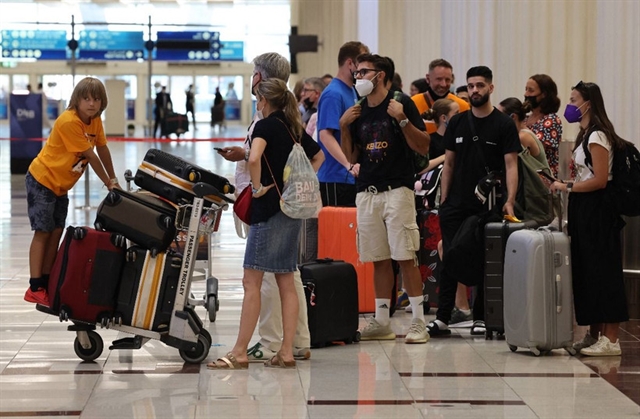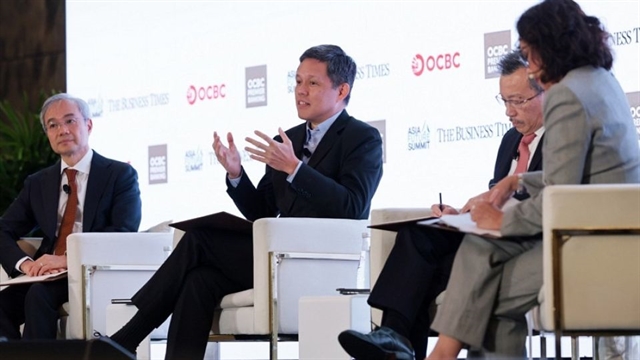 World
World


|
| Education Minister Chan Chun Sing (centre) said that AI developers here must be proficient in various AI models. — The Straits Times/ANN |
SINGAPORE — Singapore aims to be a trusted and neutral destination for collaboration in the development of artificial intelligence (AI) as US-China competition intensifies over demand, technology adoption and policy clashes.
AI developers here must be proficient in various AI models and not get entangled in an increasingly fragmented world, said Education Minister Chan Chun Sing on Monday.
Chan was speaking at a panel discussion at The Business Times Asia Future Summit 2024, which is presented by OCBC Bank and organised in partnership with Huawei. The one-day conference at Shangri-La Singapore focused on AI.
Regarding the Government’s plans to grow the nation’s proficiency in AI, Chan cited a discussion he had with the Singapore University of Technology and Design (SUTD).
“I gave them a challenge: Can SUTD be an institution unique in the world where you can have the best of both the American and Chinese (AI) models working side by side?” he told the audience of nearly 200 guests.
“We want to be seen as a trusted and neutral place where people can bring the best of technology together to collaborate and not just to compete.”
Chan’s remarks came as countries keep a close watch on developments between the US and China, which can impact global trade, innovation and other benefits of cooperation between the two tech powerhouses.
Adoption of the technology developed in different countries is not a matter of prioritising where the AI models come from, but choosing the tools that will benefit the nation, said Chan.
“We are practical people,” he said, adding: “Our test of the pudding is whether it is going to benefit us, wherever it comes from – India, China, US or Europe, or anywhere.”
Singapore also cannot simply adopt AI tools for the sake of it, but has to ensure that they are useful.
In reply to The Straits Times, SUTD president Phoon Kok Kwang said the university is open to using AI from various countries and works with global AI partners such as Meta from the US and China’s Alibaba.
SUTD aims to specialise in design and AI in its next phase of growth, which will see more partnerships in AI projects across the university, Professor Phoon said.
Growing expertise in AI for less sensitive uses like design, for instance, is a suitable area for Singapore to carve a niche and “to build trust in a fragmented world”, said Chan.
He also cited Singapore’s South-east Asian Languages In One Network (Sea-Lion) as an example of the Republic plugging a gap in the market.
Developed by AI Singapore, the agency driving the growth of the technology here, Sea-Lion is a network of ChatGPT-like large language models that are specifically trained for South-east Asian uses to ensure that there is an AI that captures the region’s cultural nuances and languages.
The panel discussion also featured OCBC group chief operating officer Lim Khiang Tong, AI Singapore senior director of AI products Leslie Teo and moderator Claressa Monteiro from The Business Times.
Asked if OCBC would bring on board Sea-Lion, Lim said that localised AI models and their ability to generate coherent responses in a local context are useful for OCBC in its regional markets.
The bank’s internal chatbot called Buddy, which helps employees get information on internal policies or documents, grew in use from around 10,000 monthly queries in 2019 to more than 250,000 monthly queries currently, said Lim.
He added that in rolling out AI, the bank continually spends time educating employees on the impact of AI and ways that they can become more productive.
Not an “arms race”
While the conference is themed “The Next Arms Race”, Mr Chan cautioned the audience against viewing global AI developments as an “arms race” where one party gains at the expense of the other.
“I’m not sure it has the right nuance. When people talk about an arms race, it connotes a competitive dynamic, which is a zero-sum game,” he said.
“If we do this well, (AI) can benefit all of us,” said Chan, noting AI’s potential to boost productivity in the economy.
Agreeing with Mr Chan, AI Singapore’s Dr Teo said the country’s AI developers work together with big tech players such as Google and Meta for greater representation of the region’s needs.
“I don’t like this ‘arms’ kind of mindset,” said Dr Teo. “We are working together… And in doing so, we give Singaporeans an opportunity to play at the global level.”
He also said that Singapore’s small size is an advantage for collaborators in AI development as systems can be deployed faster than in larger countries. The Straits Times/ANN




